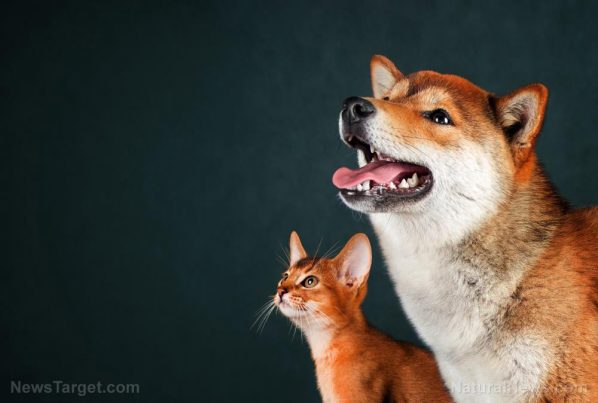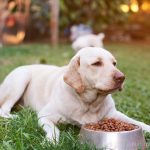
What to feed your animals during an emergency
Wednesday, February 27, 2019 by Zoey Sky
http://www.naturalnewspets.com/2019-02-27-what-you-can-feed-your-animals-during-an-emergency.html

As a prepper who keeps pets, you need to know what kinds of food are safe for animal consumption, especially if SHTF. Ideally, you should stock up on animal feed but when your supplies run out, the tips below can help you feed your animals so they stay healthy during a disaster scenario. (h/t to SurvivalSullivan.com).
You can find the foods included in the lists below in your own survival supplies or in your home garden.
Cats
Most cats have a habit of presenting freshly-killed birds, lizards, and rodents to their owners. However, some felines will try to eat these gory gifts, which can cause health problems. For example, some cats can lose weight from eating lizards. The scales of these tiny reptiles cause digestive problems in cats, and if the lizard is big enough, their scales can damage your pet’s intestines.
Cats need their protein. But when SHTF, you can feed your cat the following items:
- Cereals mixed with water or a meat broth (avoid sugary cereals)
- Cooked chicken or turkey mixed with rice (remove the bones)
- Cooked fish (without the bones)
- Cooked mashed vegetables like butternut squash or pumpkin (add some chicken or meat broth)
- Cornmeal, oats, or polenta (add chicken broth for flavor)
- Couscous with a gravy
- Tinned pilchards or other tinned fish
If your cat is starved and agile enough, it will hunt birds and mice. When food is scarce a cat can fend for itself, unless it is trapped indoors, such as when there’s a flood.
Take note that the foods in this “don’t” list can damage your cat’s long-term health.
- Chocolate – This sweet treat has theobromine, a stimulant found in higher concentrations in dark and unsweetened chocolate. Milk chocolate and white chocolate can have traces of theobromine, which can cause heart problems, muscle tremors, and seizures.
- Coffee, tea, and energy drinks – These drinks may contain caffeine, which can cause heart palpitations, muscle tremors, and rapid breathing in cats.
- Fat trimmings – The excessive consumption of fat is bad for cats, and it can cause pancreatitis. Cats with pancreatitis may suffer from dehydration, diarrhea, lethargy, poor or absent appetite, and weight loss.
- Garlic and onion – Regularly giving your cats garlic and onion can cause problems because they have an enzyme that feline digestive systems can’t handle.
- Grapes and raisins – These are bad for a cat’s kidneys.
- Milk and cream – Cats are actually lactose intolerant, so don’t give them milk and cream over long periods of time.
Dogs
Dogs are also meat eaters, so remember this the next time you want to give them a cookie (or two). (Related: A primer on herbal aids for your pets.)
You can give these foods to your dog:
- Apple slices, bananas, mulberries, oranges, peaches, and watermelon – Dogs can eat fruits. Just make sure you remove the seeds, which can cause bowel and intestinal obstruction.
- Beef, chicken, or vegetable broth (without any onions) – You can use these broths to flavor bland food like cooked cornmeal porridge, potatoes, or rice.
- Carrot sticks
- Cooked pumpkin – Use this as an extender if you don’t have dog pellets.
- Cooked sweet potato
- Corn kernels – Don’t include the cob, which can cause intestinal obstruction.
- Cow and sheep heart and lungs – These don’t look or smell nice even after they’re cooked, but dogs will eat these meats.
- Lean meat – Remove visible fat and the skin on poultry.
- Pasta
- Peanut butter
- Potatoes – Dogs can eat cooked potatoes in limited quantities.
- White rice – Add chicken broth to flavor white rice. But don’t give dogs brown rice, which contains too much fiber for them.
Dogs are scavengers, but there are some foods that can make them sick.
Don’t feed your dog anything with:
- Apple, peach, persimmon, or plums seeds – Humans can spit out the seeds or they can pass through your system, but dogs may swallow them whole. The seeds from these fruits, in particular, contain cyanide, which is toxic to dogs. Remove pips or seeds if you’re giving them any of these fruits.
- Avocado – The fruit has persin, which is non-toxic for humans but may cause diarrhea and vomiting in dogs.
- Coffee, tea, and caffeinated drinks – Like cats, dogs can’t break down the ingredients in these drinks. Caffeine can also cause kidney damage.
- Garlic and onions – These kill off red blood cells in a dog, which can cause anemia.
- Moldy food – Never let your dog eat moldy food because they may contract mycotoxin poisoning, which can kill them.
- Raw eggs – Dogs can contract E. coli from raw eggs. It’s safer to feed them cooked eggs.
- Raw meat and fish – These may cause a salmonella infection, so always feed your dogs fresh meat and fish.
- Salty food (e.g., chips and pretzels) – Too much salty food can cause sodium ion poisoning in dogs. Symptoms include diarrhea, tremors, and vomiting.
- Sugar – Like humans, dogs who consume too much sugar may suffer from diabetes, tooth decay, and weight problems.
- Xylitol – This sweetener can make a dog’s blood sugar levels drop.
When SHTF, keep these tips in mind so you can keep your pets and well-fed.
Sources include:
Tagged Under: Tags: animal food, animal health, animals, cats, Collapse, disaster, dogs, emergencies, emergency preparedness, Homestead, homesteading, livestock, natural ingredients, off grid, pet care, pet health, Pets, preparedness, preparedness and survival, prepper, prepping, prepping tips, self sufficiency, self-reliance, self-sustainability, SHTF, survival, survival supplies, Survival Tips, survivalist




